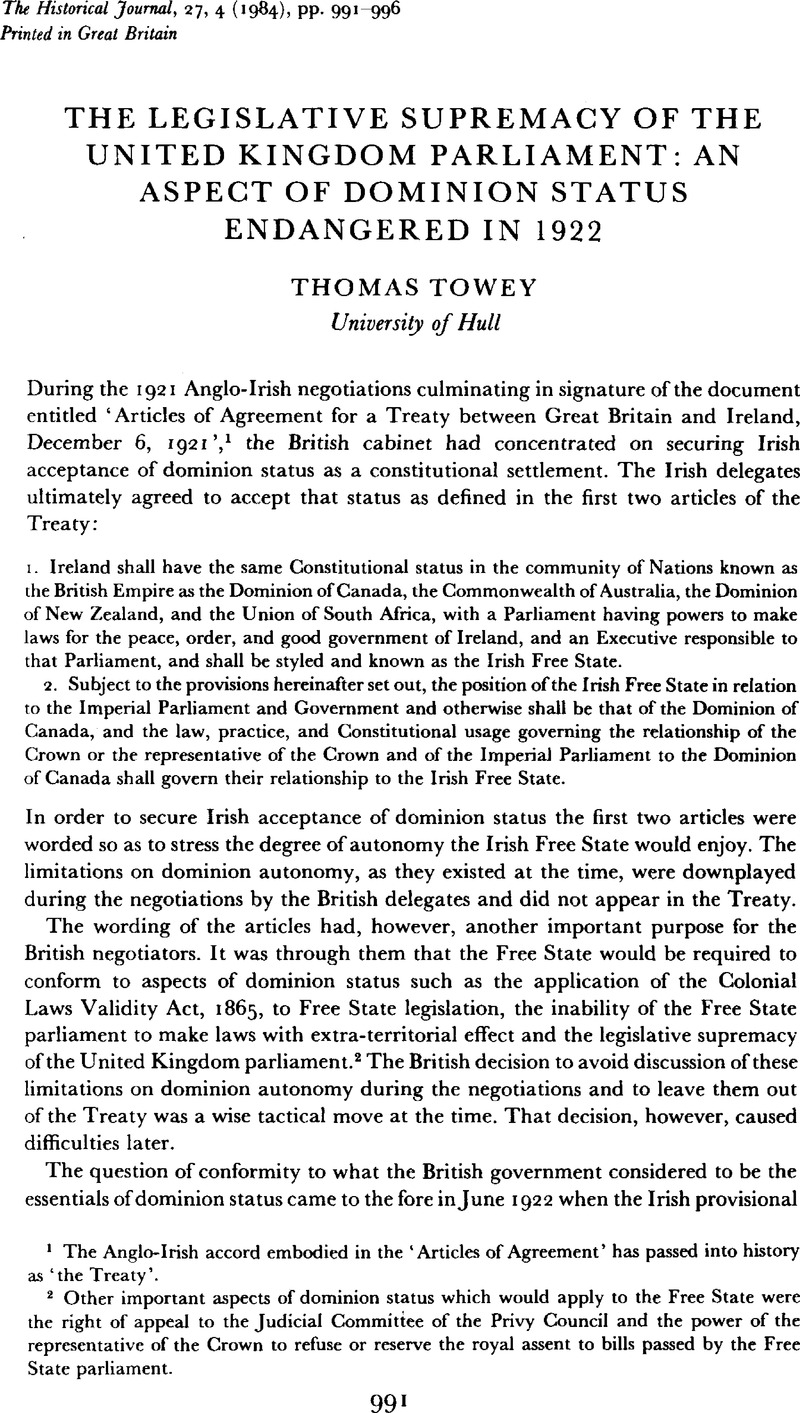Published online by Cambridge University Press: 11 February 2009

1 The Anglo-Irish accord embodied in the ‘Articles of Agreement’ has passed into history as ‘the Treaty’.
2 Other important aspects of dominion status which would apply to the Free State were the right of appeal to the Judicial Committee of the Privy Council and the power of the representative of the Crown to refuse or reserve the royal assent to bills passed by the Free State parliament.
3 Note by Lionel Curtis for the British cabinet, 27 Nov. 1922, Public Record Office, Kew, CO 739/8.
4 For the full text of the draft submitted to the British government see Farrell, Brian, ‘The drafting of the Irish Free State constitution: III–IV’, The Irish Jurist, VI (1971), 114–23 and 357–9Google Scholar.
5 For the specific alterations of what might be conveniently called the ‘dominion clauses’ of the draft see Towey, Thomas, ‘Hugh Kennedy and the constitutional development of the Irish Free State, 1922 1923’, The Irish Jurist, XII (1977), 354–64Google Scholar.
6 Dail Eireann, Official Report, 1 (1922), cols. 779–80Google Scholar.
7 Keith was a prolific writer and much-quoted authority on imperial constitutional affairs. He was, at this time, the author of three major works on the dominions: Dominion home rule in practice (London, 1921)Google Scholar, Imperial unity and the dominions (Oxford, 1916)Google Scholar and Responsible government in the dominions (Oxford, 1912)Google Scholar.
8 The Times, 16 June 1922.
9 Churchill, to Cope, , 28 09 1922, CO 739/7Google Scholar.
10 Meeting of the provisional government, 30 Sept. 1922, State Paper Office, Dublin, G 1/3, P.G. 22 (a). Cope's message was read at the meeting and incorporated into the minutes.
11 Masterton-Smith, to Hewart, , 4 10 1922, CO 739/7Google Scholar.
12 The 1917 Imperial War Conference had decided that a constitutional conference should be held after the war to consider the constitutional relationships between component parts of the Empire. The 1921 Imperial Conference decided against holding such a conference.
13 Masterton-Smith, to Churchill, , 6 10 1922, CO 739/7Google Scholar.
14 Note by Curtis for the British Cabinet, 27 Nov. 1922.
15 During the debates on the Constitution in the Dail the Provisional Government stressed the autonomy enjoyed by the dominions as one of the justifications for their acceptance of the Treaty settlement. It is perhaps for this reason that during the debates O'Higgins asserted that the Oireachtas would be a sovereign legislature. When Duffy introduced his amendment, O'Higgins referred him to article 2 of the Constitution, which he claimed already secured the independence of the Free State legislature. Article 2 stated: ‘All powers of government and all authority legislative, executive and judicial in Ireland, are derived from the people of Ireland and the same shall be exercised in the Irish Free State (Saorstat Eireann) through the organizations established by or under, and in accordance with, this Constitution.’
16 Curtis, to Freeston, L. B., Assistant Principal at the Colonial Office, for Masterton-Smith, 15 10 1922, CO 739/14Google Scholar.
17 Ibid.
18 Note by Curtis for the British cabinet, 27 Nov. 1922.
19 Note by SirLiddell, Frederick, first parliamentary counsel, 27 11 1922Google Scholar, House of Lords Record Office, Bonar Law papers, 117/7/3.
20 The Irish challenge to the legislative supremacy of the United Kingdom parliament is dealt with extensively by Harkness, D. W. in The restless dominion: The Irish Free State and the British Commonwealth of Nations, 1921–1931 (London, 1969)Google Scholar.
21 Statute of Westminster, 1931, 2 (I), 3, 4.